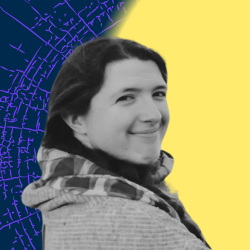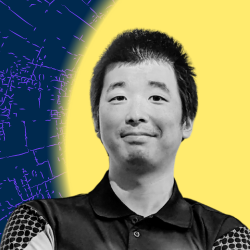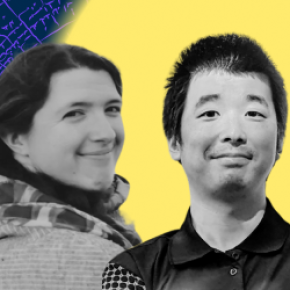CNRS Mathematics launches two new long post-doctorates in mathematics
This year, 2024, the Insmi has opened a second call for “3-year post-doctorates”, to be carried out in one of its laboratories from this autumn. Congratulations to Magalie Bénéfice and Keyao Peng. Read their interviews to find out more about their careers.
 Magalie Bénéfice
Magalie Bénéfice
- at the Institut Élie-Cartan de Lorraine (IECL), Nancy, France
Read her interview
● Hello, can you introduce yourself?
I did a bachelor's degree in mathematics at theUniversity of Bordeaux, followed by a master's degree up to the agrégation. I then worked for three years in a lycée and decided to go back to school. I took a Master 2 research course in Bordeaux to maintain some continuity. I managed to get a thesis contract on the spot with teachers I'd had in class. So I did my three-year thesis at the University of Bordeaux, the subject was: “Couplings of Brownian motions in sub-Riemannian geometry”.
● What is your field of research?
I study stochastic processes on Riemannian and sub-Riemannian varieties. The aim of my thesis was to use coupling methods, Markovian or non-Markovian couplings, with the aim of recovering functional inequalities of the Poincaré, Sobolev, Harnack, ... type.
In sub-Riemannian geometry, there are certain objects such as Ricci curvature that are quite difficult to define and study. The interest of this approach is to use probabilistic methods to try to get around this problem.
● What drew you to mathematics? Were there any decisive encounters in your career path, or results that profoundly marked your relationship with mathematics?
I came to it a little by chance. When I passed my baccalauréat, I wanted to become a school teacher, so I needed a degree. I had taken the mathematics speciality in my final year of secondary school and I really liked it. It was the subject I did best in.
At the end of the degree, I hesitated a lot. Some of my teachers encouraged me to go on and do the agrégation, which is what I ended up doing. One teacher, Marie-Line Chabanol, played an important role. She taught probability and was in charge of preparing for the agrégation. At the time, she really encouraged me to do a thesis. I didn't do it immediately, but I kept the idea in mind.
When I went into teaching, I was a little disappointed to stop doing mathematics. Later, I found out what a thesis was. I thought it sounded like fun. I went back to school with the idea of doing research. I got back in touch with this professor, Marie-Line Chabanol, who advised me on what I could do in Bordeaux.
I also benefited from the help of my Master's research professors: Adrien Richou and Marc Arnaudon. I contacted them to find an internship topic in line with the “Stochastic Calculus” course they'd taught, which I'd been very enthusiastic about. In the end, they went with me to see if there could be any related thesis topics. The subject was brought to me by Michel Bonnefont who, along with Marc Arnaudon, became my thesis supervisor. I was very enthusiastic about the subject. I came to it with a lot of curiosity, without necessarily knowing, a little bit by chance, and I really enjoyed what I was able to do.
● Why did you want to do a long post-doc?
I really liked what I did in my thesis, and I wanted to continue in research. It's really my goal to become a teacher-researcher or researcher, depending on what happens next. So I looked for post-doctoral contracts after my thesis. I started applying in January. The Insmi post-doctorate was the first positive response I received.
A 3-year post-doctorate is very advantageous. It gives you time to look ahead, to settle down, to do your research and to meet new people. The laboratory's project was really interesting, as was the laboratory itself, where there are a lot of probabilists, people I'd met at conferences, and so opportunities to work and open up to new things in the field.
When I submitted my application, I put together a dual project. In other words, on the one hand, I have the continuity of what I was able to do during the thesis, which is ultimately my personal contribution, with questions that are still open at the end of the thesis. On the other hand, there's another program proposed by a researcher from Nancy, Koléhè Coulibaly-Pasquier, which focuses on domain-value processes. That's what's so interesting about the three-year program: you can go and look at a slightly different subject while continuing what you've started with your thesis.
● What advice would you give to candidates for post-doctoral contracts?
Don't apply too late, especially for positions abroad. There are files to be completed, and you need to remember to ask for letters of recommendation. The people who have agreed to act as referees have told me that they need a little time to go through my articles so that they can give an interesting and constructive opinion.
You also need to put together a good dossier, and it's best to have an idea of who you'll be working with. Contacts are made at conferences. For the Insmi application, I'd already met Koléhè Coulibaly-Pasquier, so we were really able to discuss what we could do and put together an application tailored to the laboratory I was applying to. I think that helps a lot.
And you can't get discouraged.
 Keyao Peng
Keyao Peng
- at the Institut de Mathématiques de Bourgogne (IMB), Dijon, France
Red his interview
● Hello, can you introduce yourself?
I obtained my bachelor's degree in China in 2019, then came to France to complete a Master 2 and a thesis. I defended my thesis atGrenoble Alpes University in 2023 under the supervision of Jean Fasel. Currently, I'm working at theUniversity of Burgundy and I'm about to start an Insmi post-doctorate.
● What is your field of research?
I'm interested in many subjects. My main research area is A1 homotopy theory, which combines algebraic geometry and algebraic topology. Algebraic geometry studies spaces derived from algebra, which are normally “rigid”, while topology studies “flexible” spaces. A1 homotopy theory enables us to make “rigid” spaces more “flexible”, giving us access to more invariants. This is also related to Grothendieck's “motif”. I'm also interested in mathematical physics, such as quantum theories of topological fields (QFT). I'm looking to establish links between algebraic geometry, algebraic topology and physics.
● What drew you to mathematics? Were there any decisive encounters in your career path, or results that profoundly marked your relationship with mathematics?
I've been interested in mathematics since I was a child, thanks to my grandfather who was an engineer. When I was at secondary school, I learned that Einstein was studying calculus at college. I decided I had to study it too, which marked the beginning of my journey into advanced mathematics. In high school, I became fascinated by mathematical physics, differential geometry and dynamical systems. My favorite book at that time was V. Arnold's “Mathematical Methods of Classical Mechanics”. I like his style: the ideas are very simple and intuitive, but the results are powerful and fascinating.
In my first year at university, I took a special course in algebraic geometry given by Professor Lai King-Fai from Hong Kong, a student of Langlands. This was my first encounter with Grothendieck-style algebraic geometry, and it had a profound effect on me. I realized that there was such a thing as extremely abstract mathematics. I was quickly attracted to Grothendieck's work. Many people think that abstraction is counterintuitive, but mathematics can be abstract and still be intuitive. An original idea can be intuitive and simple, and abstraction allows it to be magnified, generalized and reinforced. So, I found my own style in mathematics and decided to do my thesis in France.
During my thesis, Jean Fasel was very benevolent. He allowed me to devote time to subjects not directly related to my thesis. I learned a lot during those years.
● Why did you want to do a long post-doc?
I decided to continue doing research in mathematics, but it's virtually impossible to find a permanent position right after defending your thesis. So I needed to do a post-doc to advance my career. There aren't many post-docs in France, and I had considered looking for a post-doc in Germany or another foreign country. But thanks to the Insmi post-doc, I can stay in France.
● What advice would you give to candidates for post-doctoral contracts?
Perhaps for research proposals, it's useful to present several projects in different directions, while still having a coherent overall vision. And above all, don't hesitate to show your enthusiasm for mathematics.
Crédits
© Magalie Bénéfice, all rights reserved | © Keyao Peng, all rights reserved
